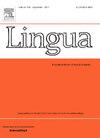副词与句末语气词之间的依存关系:粤语中确认情态和非确认情态的案例
IF 1.3
3区 文学
0 LANGUAGE & LINGUISTICS
引用次数: 0
摘要
本研究探讨了粤语副词mai6、句末语气词(SFP)lo1和mai6...lo1结构的证据性和认识论模态。我认为 mai6 起着推理证据的作用,而 lo1 则表达说话人的认识论态度。它们在 mai6...lo1 结构中的共同出现突出了认识模态和证据模态之间的重叠,认识模态较强,证据模态较弱。这种搭配代表了两种强度不同的类型匹配模态。mai6 独立出现的不可接受性表明,确认和非确认之间的区别对决定证据副词和认识模态的分布至关重要。为了避免单一模态的双重实现,确认性模态 SFP 起着强度操纵者的作用,增强非确认性对应模态的强度。这样,非确认型的力度就从弱确认转化为强确认。最后,确认性 SFP 的确认程度各不相同:强确认性 SFP 可以与非确认性语素一起出现,也可以独立出现,而弱确认性 SFP 只能独立出现。本文章由计算机程序翻译,如有差异,请以英文原文为准。
Dependencies between adverbs and sentence-final particles: A case of confirmative and non-confirmative modals in Cantonese
This study examines the evidentiality and epistemic modality of the Cantonese adverb mai6, the sentence-final particle (SFP) lo1, and the mai6…lo1 construction. I argue that mai6 functions as an inferential evidential, while lo1 expresses the speaker’s epistemic attitude. Their co-occurrence in the mai6…lo1 construction highlights the overlap between epistemic modality and evidentiality, with epistemic modality being stronger and evidentiality weak. This pairing represents two type-matching modals with varying strengths. The unacceptability of mai6 occurring independently suggests that the distinction between confirmation and non-confirmation is crucial in determining the distribution of evidential adverbs and epistemic modals. To avoid double realisation of a single modality, confirmative modal SFPs act as strength manipulators, enhancing modal strength of their non-confirmative counterparts. The force of the non-confirmative type is then converted from weak to strong confirmation. Finally, confirmative SFPs vary in their levels of confirmation: strong confirmative SFPs can occur with non-confirmative morphemes or independently, while weak ones can only occur independently.
求助全文
通过发布文献求助,成功后即可免费获取论文全文。
去求助
来源期刊

Lingua
Multiple-
CiteScore
2.50
自引率
9.10%
发文量
93
审稿时长
24 weeks
期刊介绍:
Lingua publishes papers of any length, if justified, as well as review articles surveying developments in the various fields of linguistics, and occasional discussions. A considerable number of pages in each issue are devoted to critical book reviews. Lingua also publishes Lingua Franca articles consisting of provocative exchanges expressing strong opinions on central topics in linguistics; The Decade In articles which are educational articles offering the nonspecialist linguist an overview of a given area of study; and Taking up the Gauntlet special issues composed of a set number of papers examining one set of data and exploring whose theory offers the most insight with a minimal set of assumptions and a maximum of arguments.
 求助内容:
求助内容: 应助结果提醒方式:
应助结果提醒方式:


